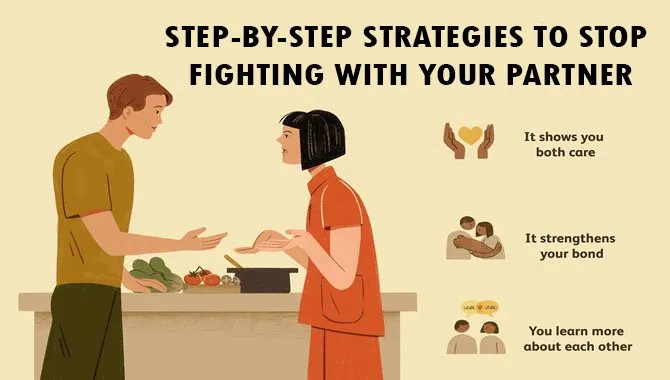<strong>Quick Summary</strong>: The best relationship advice for couples, especially during arguments, focuses on open communication, active listening, empathy, and finding common ground. Prioritize understanding your partner’s perspective, managing emotions constructively, and committing to solutions that benefit both of you. Healthy relationships thrive on consistent effort and mutual respect.
Welcome! Navigating the ups and downs of a relationship can sometimes feel like a puzzle. It’s completely normal for couples to face challenges, especially when disagreements arise. You’re not alone if you’ve found yourselves wondering how to keep your connection strong and healthy. The good news is that building a lasting, loving partnership is absolutely achievable. With a few key strategies, you can transform potential conflicts into opportunities for growth. Get ready to discover practical, easy-to-follow tips that will help you and your partner connect on a deeper level and build a more fulfilling relationship, starting today!
Understanding the Foundation of a Strong Relationship
At its heart, a strong relationship is built on a bedrock of mutual understanding, respect, and open communication. It’s not about never disagreeing; it’s about how you navigate those disagreements. Think of your relationship as a garden. It needs regular care, attention, and the right conditions to flourish. When both partners are invested in nurturing that growth, the relationship becomes a source of joy, support, and unwavering companionship.
What makes a relationship truly resilient? It’s the shared commitment to cherishing each other, even when things get tough. It’s about seeing your partner not just as a lover, but as a best friend, a confidant, and an ally. This deep connection doesn’t happen by accident; it’s cultivated through daily actions and intentional effort. We’ll explore how to foster this environment, making sure your relationship is a safe and loving space for both of you.
Essential Tips for Couples: The Core Pillars
Building a solid relationship involves focusing on several key areas. Imagine these as the pillars supporting your shared life. When these pillars are strong, your relationship can withstand storms and continue to stand tall. Let’s break down these essential elements:
1. Open and Honest Communication: The Lifeline
Communication is more than just talking; it’s about truly being heard and understood. In any relationship, especially between men and women, clear communication is vital. It’s the bridge that connects your inner worlds. When you can express your thoughts, feelings, and needs without fear of judgment, a deeper bond forms. Conversely, unspoken resentments or misunderstandings can create distance and frustration.
Key aspects of open communication include:
- Expressing Feelings Clearly: Use “I” statements to share how you feel, rather than blaming your partner. For example, say “I feel hurt when…” instead of “You always make me feel…”
- Active Listening: This means paying full attention when your partner speaks, not just hearing the words but understanding the emotions behind them. Put down your phone, make eye contact, and nod to show you’re engaged.
- Honesty with Kindness: Be truthful, but deliver your message with compassion and respect. The goal is understanding, not causing pain.
- Regular Check-ins: Don’t wait for a problem to arise. Schedule time to talk about your day, your dreams, and any concerns you might have.
2. Active Listening: More Than Just Hearing
Active listening is a skill that can dramatically improve your connection. It’s about being fully present and engaged when your partner is speaking. This involves more than just waiting for your turn to talk; it’s about truly absorbing what they are saying, both verbally and non-verbally.
How to practice active listening:
- Pay Undivided Attention: Set aside distractions like phones or TV. Focus entirely on your partner.
- Show You’re Listening: Use non-verbal cues like nodding, maintaining eye contact, and leaning in.
- Seek Clarification: If something is unclear, ask open-ended questions to ensure you understand. Phrases like “Can you tell me more about that?” or “What did you mean when you said…” are helpful.
- Empathize: Try to put yourself in your partner’s shoes. Validate their feelings even if you don’t agree with their perspective. Saying “I understand why you would feel that way” can go a long way.
- Avoid Interrupting: Let your partner finish their thoughts before you respond.
3. Empathy and Understanding: Walking in Their Shoes
Empathy is the ability to understand and share the feelings of another. In a committed relationship, particularly between men and women who may process emotions differently, empathy is a powerful tool. It’s about stepping outside your own perspective to truly grasp your partner’s emotions, motivations, and experiences.
Cultivating empathy involves:
- Perspective-Taking: Make an effort to see situations from your partner’s point of view. Ask yourself: “What might they be feeling? Why might they react this way?”
- Validating Feelings: Acknowledge and accept your partner’s emotions, even if you don’t fully agree with the reason for them. “It makes sense that you would feel frustrated” is a simple yet powerful statement.
- Showing Compassion: Be kind and supportive, especially when your partner is struggling or feeling vulnerable.
- Curiosity Over Judgment: Approach your partner’s experiences with a genuine desire to learn, rather than judging their reactions.
4. Respect: The Corner-stone of Any Bond
Respect is fundamental to a healthy relationship. It means valuing your partner as an individual, appreciating their uniqueness, and treating them with consideration. Lack of respect can erode trust and create resentment. It’s about acknowledging their worth, their boundaries, and their autonomy.
Demonstrating respect looks like:
- Valuing Their Opinions: Even if you disagree, listen to and consider your partner’s thoughts and ideas.
- Honoring Boundaries: Respect your partner’s personal space, time, and emotional limits.
- Appreciating Their Contributions: Acknowledge and value what your partner brings to the relationship and your shared life.
- Avoiding Contempt: Roll your eyes, sarcasm, and insults erode respect. Strive for kind, respectful interactions even during disagreements.
Navigating Arguments: Best Relationship Advice For Couples During Arguments
Disagreements are unavoidable in any relationship. The key isn’t to avoid conflict, but to learn how to manage it constructively. When arguments are handled well, they can strengthen your bond and lead to deeper understanding. The goal is to resolve issues without causing lasting damage to your connection. Here’s how to approach arguments as a team.
1. Pause Before Reacting
When emotions run high, it’s easy to say things you regret. Taking a pause, even for a few minutes, can make a world of difference. This isn’t about stonewalling; it’s about regaining composure.
How to take a constructive pause:
- Recognize Your Triggers: Know what makes you feel defensive or overwhelmed.
- Communicate Your Need for a Break: Say something like, “I need a few minutes to calm down so I can talk about this more clearly. Can we revisit this in 15 minutes?”
- Use the Time Wisely: Step away, take deep breaths, hydrate, or do something calming. Avoid ruminating or planning your next attack. Focus on bringing yourself back to a balanced state.
2. Focus on the Issue, Not the Person
During heated discussions, it’s common to shift from discussing a problem to attacking your partner’s character. This is incredibly damaging. Keep the focus on the specific behavior or situation causing the conflict.
Tips for staying on track:
- Avoid “You Always” or “You Never”: These generalizations are rarely true and put your partner on the defensive.
- Be Specific: Instead of “You never help me,” try “I felt overwhelmed yesterday when I had to do all the chores myself.”
- Address One Issue at a Time: Avoid bringing up past grievances or unrelated problems, which can derail the conversation.
3. Listen to Understand, Not Just to Respond
This is where active listening becomes crucial during conflict. Your partner’s perspective is valid to them, even if it differs from yours. Truly hearing them can de-escalate tension immediately.
Put active listening into practice during arguments:
- Focus on Their Words and Feelings: Try to understand the underlying emotions driving their complaint.
- Resist the Urge to Interrupt: Let them fully express their point of view.
- Summarize and Reflect: “So, if I understand correctly, you’re feeling frustrated because you think I didn’t consider your needs when I made that decision. Is that right?”
4. Brainstorm Solutions Together
Once both partners feel heard and understood, the next step is to find a solution. Frame this as a team effort to overcome a shared challenge.
Collaborative problem-solving:
- Identify Common Goals: “We both want to feel respected and happier in our home.”
- Generate Multiple Solutions: Brainstorm as many ideas as possible without judgment.
- Evaluate Options: Discuss the pros and cons of each potential solution.
- Agree on a Plan: Choose a solution that you both feel comfortable with and commit to trying it.
- Be Prepared to Compromise: Rarely will one person get everything they want. Finding middle ground is often necessary.
5. Know When to Seek Outside Help
Sometimes, despite your best efforts, you may find yourselves stuck in repetitive patterns or unable to resolve conflicts. This is a sign that professional help might be beneficial. Couples counseling isn’t a sign of failure; it’s a proactive step towards a healthier relationship.
An external perspective from a trained therapist can offer new insights and tools. Organizations like the National Domestic Violence Hotline, while focused on safety, also offer resources that can guide individuals and couples toward healthier interaction patterns, and the American Association for Marriage and Family Therapy (AAMFT) can help you find a qualified professional.
Building Connection Beyond Conflict
While managing conflict is crucial, a thriving relationship is also about nurturing positive connection and intimacy. These efforts create a reservoir of goodwill that makes navigating tough times easier. Think of this as regularly filling your relationship’s “love tank.”
1. Quality Time Together
In our busy lives, it’s easy for couples to drift apart. Intentionally scheduling quality time is essential for maintaining your bond. This doesn’t always mean grand gestures; it can be as simple as a shared meal or a quiet evening.
Ideas for quality time:
- Date Nights: Schedule regular outings, whether it’s dinner, a movie, or a walk in the park.
- Shared Hobbies: Engage in activities you both enjoy, like hiking, cooking, or playing games.
- Unplugged Evenings: Dedicate time each week to disconnect from electronics and simply be present with each other.
- Meaningful Conversations: Beyond daily logistics, discuss your hopes, dreams, and feelings.
2. Expressing Appreciation and Affection
Don’t underestimate the power of a simple “thank you” or a loving gesture. Regularly expressing appreciation shows your partner that they are seen and valued.
Ways to show appreciation:
- Verbal Affirmations: Tell your partner what you love and admire about them.
- Acts of Service: Do something helpful for your partner, like making their coffee or handling a chore they dislike.
- Physical Touch: Hugs, holding hands, or a comforting touch can communicate love and security.
- Thoughtful Gestures: A small gift, a loving note, or planning a surprise can make your partner feel special.
3. Supporting Each Other’s Growth
A healthy relationship encourages individual growth and personal aspirations. When your partner pursues their passions or works towards their goals, supporting them strengthens your partnership.
How to be a supportive partner:
- Encourage Their Dreams: Listen to their aspirations and offer words of encouragement.
- Celebrate Their Successes: Be their biggest cheerleader when they achieve something.
- Be There During Challenges: Offer comfort and practical help when they face setbacks.
- Allow for Individual Pursuits: Recognize that while you’re a couple, you are also individuals with distinct needs and interests.
Common Relationship Hurdles and How to Overcome Them
Every couple faces unique challenges. Understanding these common hurdles is the first step to successfully navigating them. Here’s a look at a few, and how the principles we’ve discussed can help:
| Common Hurdle | Impact on Relationship | How to Address It |
|---|---|---|
| Financial Disagreements | Can lead to stress, resentment, and feelings of inequality. | Schedule regular financial “dates” to openly discuss budgets, spending habits, and savings goals. Practice active listening and compromise. Transparency is key. Consider resources on financial planning for couples. |
| Lack of Quality Time | Creates distance, feelings of loneliness, and a partner feeling unprioritized. | Schedule dedicated, distraction-free time together weekly or bi-weekly. Revisit shared hobbies and interests. Even short, meaningful interactions can make a difference. |
| Communication Breakdowns | Misunderstandings, unmet needs, and escalating conflicts. | Implement active listening techniques. Use “I” statements. Agree to take breaks when emotions run high. Consider resources on communication skills for relationships. |
| Intimacy Issues (Emotional/Physical) | Can lead to feelings of rejection, disconnection, and reduced relationship satisfaction. | Open, honest, and vulnerable conversations about desires and needs are crucial. Seek professional help if persistent issues arise. Focus on building emotional intimacy first. |
| Differing Life Goals/Values | Can cause friction and incompatibility over time if not addressed. | Regularly discuss your individual and shared long-term goals. Understand each other’s core values. Seek compromise and support for individual paths where possible. |
Frequently Asked Questions (FAQ)
Q1: How often should couples communicate about their relationship?
A: Ideally, couples should communicate about their relationship daily through small check-ins, and have more in-depth conversations at least weekly. Regular, open communication prevents small issues from becoming big problems.
Q2: What’s the difference between a disagreement and a fight?
A: A disagreement is a difference of opinion or perspective that can be discussed respectfully. A fight often involves raised voices, personal attacks, and an intent to “win” rather than to find a solution. Healthy relationships focus on having disagreements constructively.
Q3: My partner and I have very different communication styles. How can we bridge that gap?
A: Recognize and respect your differences. One partner might be more direct while the other is more indirect. Practice active listening, ask clarifying questions, and consciously try to adapt your style to meet your partner’s needs and vice versa. It’s about finding a middle ground where both feel understood.
Q4: How can I show my partner I respect them, especially when we’re arguing?
A: Even during arguments, you can show respect by listening attentively, avoiding insults or name-calling, acknowledging their feelings (“I hear that you’re upset”), and sticking to the issue at hand without bringing up




